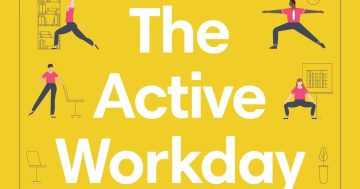Stephanie Lewis* says consistency is key to making new habits and breaking old ones.
 With the new year ahead, are you looking to create new habits?
With the new year ahead, are you looking to create new habits?
Habits can move us forward or they can hold us back. Regardless, they define who we are.
We can turn unhealthy or unproductive habits into healthier or productive ones by mastering the concept of consistency.
Habits are formed by repetition.
If you think about the definition of the word “habit,” you think of something you do out of routine, often subconsciously.
You don’t wake up one day with a new habit. You form a habit over time through actions.
Even those habits that hold us back are the result of repeated daily actions, some which you may not be aware of.
That’s one of the primary reasons why it’s challenging to break them.
Awareness is the first step. And, instead of breaking habits, think about flipping them into healthier ones with consistent positive actions.
Let’s look at mindful or intuitive eating as an example.
Using mindful and intuitive eating to create new habits.
Think of an unhelpful habit you have when it comes to eating. One example would be emotional eating when you’re feeling stressed.
Naturally, your will to eat is fuelled largely by your body’s physical hunger.
Let’s say, though, you have a habit of consuming more calories or “comfort foods” to satisfy an emotion.
That’s pretty common, particularly in the midst of this pandemic.
However, at some point, you may decide that enough is enough and you want to get into the habit of using food to satisfy your body.
You can do this through mindful or intuitive eating.
Instead of focusing on food as punishment or as a source of happiness, seek food primarily as nourishment.
I’m not proposing that you take the joy out of eating. Please don’t.
I am encouraging you though to pay attention to your hunger signals.
When your body is hungry, you eat. Don’t let the stories you tell yourself carry you away. Simply be present in the moment.
Using mindful eating helps you stay in the moment and be aware of what is driving you to eat, physical hunger or otherwise.
I know this is easier said than done. To start, pick one or two things and work with them gradually.
If, for instance, you have difficulty recognising your hunger signals, that is just one example of a place to start.
To begin to create some consistency in your practice, ask yourself a few times a week when you have the urge to eat if you’re physically hungry (or if you’re actually hungry for something else) and build from there.
Begin to learn to listen to your body.
Is your body yearning for food or does it need water or companionship?
Savour every bite of food; satisfy your physical hunger.
When you feel yourself getting full, then stop. (Yes, even if there is food still on the plate. You can use a smaller plate or save the remaining food as leftovers.)
Be at peace with what you’ve done. You’ll learn a lot from this non-diet, weight-neutral mindful eating practice, including why you eat when you do and how you can better serve your body.
Staying consistent (and patient) helps this approach to nourishing your body become a new habit that supports your overall wellness.
Consistency applies to the development of any new habit.
The need for consistency applies to any new habit you want to form, not just mindful eating.
If you want to have a consistent mindfulness practice so you can better navigate your day, increase your physical activity so you can be more fit, have a daily writing practice so you can fulfill your creative expression, engage in daily prayer for a deeper spiritual connection, or improve your sleep habits so you can be well-rested and alert during the day, it all happens with consistency.
*Stephanie Lewis is a National Board certified health and wellness coach.
This article first appeared at ellevatenetwork.com.











